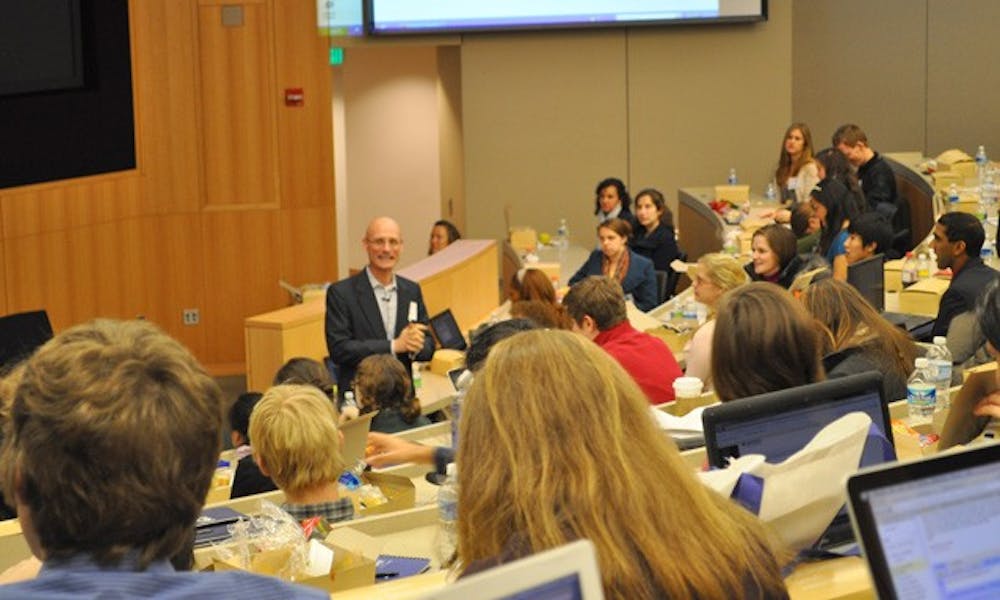What should be done if the world faces the crisis of a pandemic?
Duke students tackled this question at the second annual Winter Forum: “Pandemic 2011: Are You Ready?”
The two and a half day forum, hosted by the Duke Global Health Institute, began Jan. 9 and was held at the Fuqua School of Business.
The event was a simulation of a pandemic complete with fake news broadcasts updating Duke students on the progress of a disease called “The Chinese Flu.” Students were asked to role-play policy makers, and in various panel discussions and activities they answered tough questions such as how to reduce medical costs, which members of the population deserved priority in vaccine administration and what jurisdiction the government had in its efforts to contain the disease.
“At the end of the day, we all know that after this forum, when a pandemic strikes next, we will be more prepared,” said forum participant Braveen Ragunanthan, a junior.
The opening night of the forum featured keynote speaker Dr. Anne Schuchat, assistant surgeon general and director of the National Center for Immunization and Respiratory Diseases. Schuchat discussed the challenges presented by influenza epidemics and the steps necessary to contain them.
The 110 undergraduates who attended came from backgrounds ranging from pre-medical to photography, and the goal was to ensure that all participants played a role in the simulation, said David Boyd, associate professor of the practice of global health, who was also the faculty director of the event.
“[The event] aggregated groups of various interests to talk about how individual academic pursuits could aid in the containment of a pandemic,” Boyd said.
Steve Nowicki, vice provost and dean of undergraduate education, called the event an “effort to apply what students learn in their classes.”
The forum also hosted speakers from across the globe, including a video conference with Dr. Rutao Wang from China who provided the Chinese perspective on the surveillance and control of epidemics.
Nowicki noted that this year’s event was larger than the Winter Forum held last year. About 70 students attended “Making the Green Economy Work,” which was hosted by the Nicholas Institute for Environmental Policy Solutions.
Boyd said the key ideas speakers reinforced were the constant presence of potential health threats and the fact that not every disease is preventable.
“We selected this year’s topic because we wanted to look at a global health topic [which was] both relevant and would show the world that they needed to be prepared for a crisis,” he said.
During the forum, students participated continually and were encouraged to defend their opinions and ask the speakers questions.
The forum served as a microcosm for the decision making group that has to respond in the case of a pandemic said participant Helen Cai, a freshman.
“All the participants were given the same background readings and the same lectures, but depending on personal values and what roles we had to assume, [participants] tended to disagree severely on the best policy implemented,” she said. “I learned that influenza outbreaks are extremely unpredictable and that policy making cannot merely be decided on health considerations.”
Along with these pragmatic lessons, students also came to conclusion that “patient zero” in their simulation, the one responsible for spreading the pandemic, was Duke’s very own President Richard Brodhead.
Several students also seemed to appreciate the heightened use of technology throughout the forum. All of the required reading for the event was online along with summaries of each day’s panel discussions, activities and student interviews. The site was created to be user friendly, so that even those students who were unable to attend the conference could benefit from it, said DGHI Assistant Director for Communications Geelea Seaford.
Ragunanthan said the expert panels used real-life examples, like the H1N1 panic, to show how susceptible the world’s population is to these kinds of global medical scares.
“The different speakers... raised questions for students to contemplate from all angles,” he said. “No stone [was] left unturned.”
Get The Chronicle straight to your inbox
Signup for our weekly newsletter. Cancel at any time.

